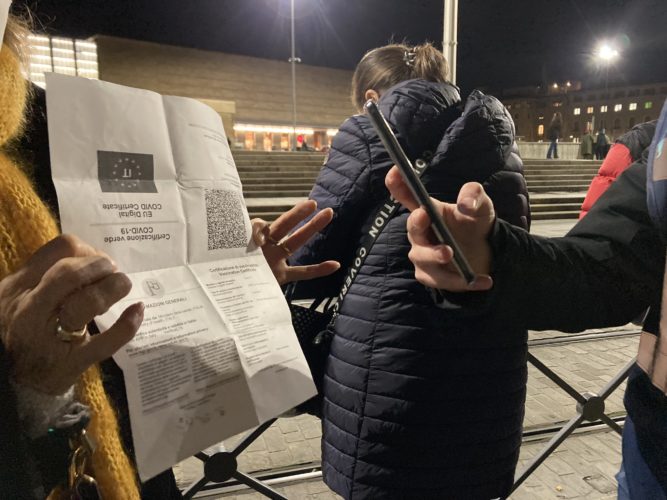Mask & Green Pass Regulation Updates

Forty patrols of men and women in uniform — including members of the carabinieri military police, the police, traffic cops, the finance police, work inspectors, highway troopers, and even forest rangers — have been assigned in Florence to check whether people have Green Passes under appropriate circumstances, confirmed the city’s prefect.
Already mandatory on interregional trains, either a ‘Super Green Pass’ or a normal Green Pass will be necessary in order take public transport ranging from buses and trams to regional trains and ferries according to the latest government decree, and patrolling officials are asking for documentation. Checks will continue be made by authorities to ensure that passengers are in possession of a valid certification. Exceptions include taxis and cars with up to nine seats, where Green Passes are not needed. Passengers in their own vehicles also do not need one either, however in an orange zone, those without a Green Pass can only travel for work, health and essential services. Children under the age of 12 on school buses also do not need a Green Pass. All students taking public transportation over the age of 12 must have a Green Pass.
Autolinee Toscana personnel are stationed at city bus stops to ask passengers who arrive at destination to show either their digital or printed Green Pass.
As part of the ‘acquisiti sicuri’ policy for Florence, masks are also now mandatory in areas that attract a lot of people. Dario Nardella, the mayor of Florence, has said that with “the greater influx of people for traditional Christmas shopping, we introduced the obligation to wear a mask even when outdoors where a high probability of COVID contagions is likely to occur.” The ordinance will be in place from December 17 to 19, 23 to 26, 30 and 31, in force from 10 am to 10 pm on each of those days. Patrolling authorities may also be present to ask for a Green Pass to ensure that pedestrians are not at risk of spreading or contracting COVID.
Areas covered by this decree include Piazza Duomo, Piazza San Giovanni, Via de Pecori, Via dell’Agli, Piazza Antinori, Via Tornabuoni, Piazza Santa Trinità, Lungarno degli Acciaiuoli, Via Por Santa Maria, Ponte Vecchio, Via Vacchereccia, Piazza della Signoria, Via de’ Gondi, Via del Proconsolo, Piazzale degli Uffizi, Via dei Neri, Piazza San Lorenzo, Borgo San Lorenzo, Piazza Santa Croce, Via Gioberti, Borgo La Croce, Via Pietrapiana, Piazzale Oriana Fallaci with access from Viale Strozzi and Piazzale Caduti dell’Egeo (the garden of the Fortress), and the San Donato shopping center.
Italy will also see further changes throughout all sectors of day-to-day life, thanks to the introduction of the Super Green Pass. At ski resorts, an open-air lift is available to everyone, unless the region enters the orange zone, in which case only passengers with a Super Green Pass may take one. Passengers must have either the normal or Super Green Pass in order to take a gondola.
With regards to work, a Green Pass is needed regardless of the workplace and labor done, which includes both public and private jobs no matter whether a region is in the white, yellow or orange zone. Similarly, a Super Green Pass is mandatory across all recreational activities such as visiting a museum and other cultural sites, eating at a restaurant, going into a bar, sport facilities. All of these regulations apply to non-EU visitors, along with the added mandate that a third dose of the vaccine is needed in order to access museums and other places of culture. (nelson matos/additional reporting by rosanna cirigliano)
